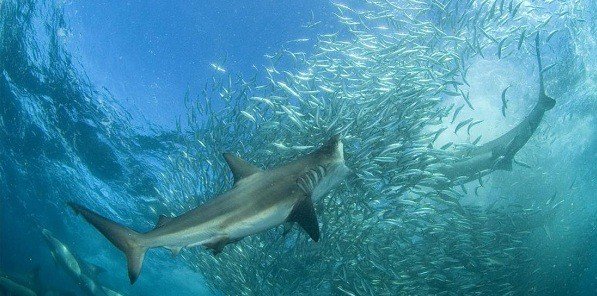Sardine

Sardine, also known as anchovy, is a small sea fish with a length of 15-20 cm, less often up to 25 cm, belonging to the herring family. Her back is blue-green, both sides of her body and belly are silvery white.
This is one of the most beautiful fish – several of the colors of the rainbow can be seen on its back.
The way of life of the anchovy is not well enough studied – it is known that in the summer from the deeper parts of the sea this fish comes out to the shores of the Atlantic Ocean and then disappears again for a long period of time.
To the Atlantic basin belong the Mediterranean and the Black Sea, in which the anchovy is found in more limited quantities.
Nutritional value of 100 grams of anchovy
The Atlantic sardine, which is available on the Bulgarian market, contains about 20 grams of protein, 9 grams of fat, and its energy value is 250 kilocalories.
Benefits
One of the most important advantages of the anchovy is that its meat is one of the best sources of protein and is also easily digested by the body.
Furthermore, the sardine contains the entire set of elements necessary for the maintenance of human health – zinc, phosphorus, calcium, potassium, iodine, magnesium, fluorine, and also some others.
Sardine is a very high-calorie food, and the unsaturated fats that this fish is rich in are much more beneficial than those of animal origin.
In connection with the wide range of useful properties that sardine possesses, its consumption is recommended for pregnant women and also for those during lactation.
The benefits of sardines for the bone system have been proven, as regular use of this fish reduces the risk of arthritis and atherosclerosis.
Since the anchovy contains nicotinic acid, this fish helps to improve the condition of the nervous system and even has the ability to limit the symptoms of mental disorders.
The calcium-rich anchovy should be consumed for the prevention and treatment of arthrosis and osteoporosis. The strong antioxidant coenzyme Q10 contained in it is effective against premature aging of the skin.
The high levels of iron in sardines recommend it as a mandatory part of the diet of people suffering from the deficiency of this mineral.
And 100 grams of this fish contains the daily amount of vitamins B3 and B6, fatty acids, zinc and phosphorus required by the human body.
Consumption of anchovies is necessary for the prevention of oncological diseases, in case of immune deficiency.
In addition, sardine refers to the small types of fish that do not accumulate mercury in dangerous amounts, and therefore do not pose a danger to the human body and, in particular, to children.
It is optimal to use 350 grams of anchovies per week.
Contraindications
Sardine should not be used in cases of individual intolerance, as well as in case of gout and a tendency to deposit salts other than calcium in the bones.
People suffering from hypertension need to know that this fish increases blood pressure.
For various diseases of the gastrointestinal tract, doctors recommend eating stewed sardines or in tomato sauce without added fat such as oil or other vegetable oil.
People suffering from obesity should not abuse this fish because of its high caloric content.



